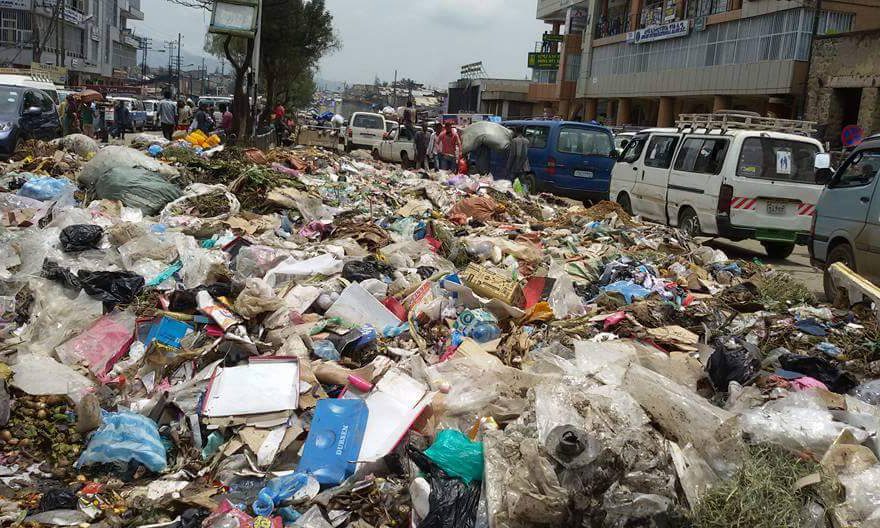
BY STAFF REPORTER
Increasing populations, urbanization, industrialization, and changing consumption patterns result in increasing amounts of solid waste and its diversification. Solid waste comprises all the wastes arising from human activities that are normally solid, discarded as useless or unwanted by-products of process lines or materials that may be required by law to be disposed of. It has become a recurring feature in the urban environment, and it is the most visible environmental problem among many in urban areas.
Though the volume of solid waste generated in Africa is small compared to developed regions, less than half of the solid waste produced is collected, and 95 percent of that amount is either indiscriminately thrown away at various dumping sites on the periphery of urban centres, or at several so-called temporary sites, typically empty lots scattered throughout the city.
Solid waste collection services are challenging in most areas of developing cities; an estimated 30–50 percent of solid waste generation within urban centres is left uncollected.
Improper solid waste management (SWM) is a major public health and environmental concern in the urban areas of many developing countries. A community-based cross-sectional study design was used to assess the status of improper SWM and associated factors in Asella town. From among 413 households included in study 332 (82.8%), had improper solid waste management practice. Lack of adequate knowledge about solid waste management and not having access to the door to door solid waste collection could have contributed to the reported improper solid waste practice.
Ethiopia is one of the low-income countries facing the consequence of improper solid waste management. It was reported that about 20 to 30 percent of the waste generated in Addis Ababa, the capital city, remains uncollected. Proper solid waste management requires the commitment of the town municipality and the active involvement of the community members. There are many initiatives taking place in Ethiopia to improve environmental health, especially in the capital city. In Addis Ababa, the awareness of the community members about solid waste management is enhanced and more than 70% of the community inhabitants were willing to pay for door to door solid waste collection service which is one of the initiatives introduced by the government.
The relevance of the recycling sector in Ethiopia is twofold: on the one hand, there is a lack of raw material, on the other hand, an informal recycling system takes place.
The high dependence on the import of raw materials in combination with the foreign exchange crunch and high transportation costs lead to prices that are two to three times higher than those on the international market. As a result, the importance of reuse and recycling as a source for domestic raw material is high.
Along with this, there is an informal recycling system in place with one of the highest recycling rates in East and Central Africa that are comparable to some European countries.
Aside from the recycling of post-consumer waste, the reuse of industrial waste in the production of plastic items is very common. Most production sites have grinders to process the production offcut into reusable re-granulate that is utilized for production and mostly exported to gain foreign currency. The main reason for this is the technology gap, which prevents the pre-treated feedstock (e.g. PET-flakes, paper pulp) to be processed into raw materials that can be used in production.
Exceptions are post-consumer metal scraps, used to produce enforcement of bars and billets, as well as thermoplastics other than PET, which are used for producing household wares. The latter cannot be exported as the materials do not meet the needed quality requirements. In practice, municipal waste is collected by municipal waste management companies and brought to landfills. It consists mainly of organic waste with small amounts of plastic, paper and metal waste. The recycling of municipal waste is executed by the informal sector: informal collectors and so-called “Korales” gather all kinds of recyclables from streets and landfills. Recycled materials are not only restricted to plastic, paper, glass, and metals but also contain biomass, textiles, rubber, silt, ash, dust and waste oil since the demand for these raw materials is high.
However, the policy, collection and technology for recycling is still a challenge. Polyethene terephthalate (PET) is mostly collected from hotels and gastronomies. The informal collectors sell the segregated waste to middlemen, who supply the recycling companies with the materials. The informal sector is loosely organized and in parts subsidized by the Solid & Hazardous Waste Compliance Monitoring Directorate, as the collectors get a subsidized price for the raw material. At the beginning of 2018, over one hundred informal collectors died in a landfill near Addis Ababa due to a big landslide of waste.
Recycling is directly promoted through subsidies for the informal sector and indirectly encouraged via federal policies like the Ethiopian Environmental Policy (1997) and the Climate-Resilient Green Economy (CRGE) Vision. Some of the economic policies like investment and industry policies promote recycling by providing incentives, such as tax exemptions. Services of start-ups, mostly founded by the youth engaged in the recycling sector, are tax-free. This is an extension of the policy for employment by promoting micro and small enterprises (MSE). Recyclers organized as MSE are encouraged and supported by public bodies through training that offers technical know-how and literature.
The Ethiopian Herald September 1/2021




